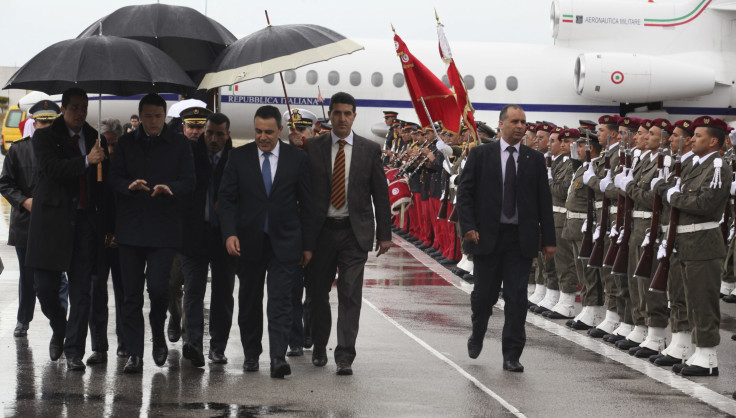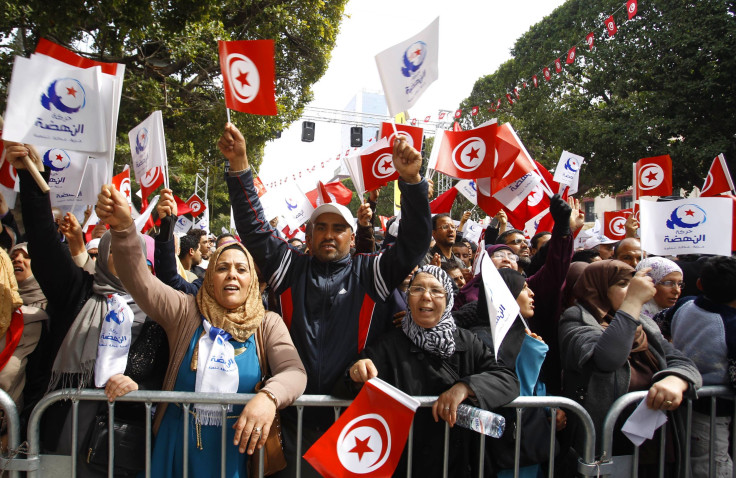Show Me The Money: Tunisia, Which Launched The Arab Spring, Illustrates Region's New Economic-Political Dilemma

TUNIS, Tunisia – Wasseem, 27, is a college graduate with a degree in Arabic. He has been unemployed for five years, and last week went to the city’s Kasbah Square, site of the prime minister’s office, to denounce another in a series of controversial government decisions.
“We reject the prime minister’s announcement,” Wasseem, who declined to give his last name, said, referring to new Prime Minister Mehdi Jomaa’s pledge earlier this month to freeze public sector hiring. “We came today to defend our right to work and our right to live,” Wasseem added.
Demonstrators, led by the UDC, a union of unemployed university graduates, said Tunisia’s current government, like its predecessors in the days before the Arab Spring, fails to take youth unemployment, estimated at 30 percent, seriously. “They push us,” he said.
Jomaa didn’t hear the protester’s slogans, however, because he was not in his office. He was off on a trip through the oil-wealthy Gulf to round up more loans and aid money for Tunisia’s staggering economy.
Faced with high unemployment, a burgeoning informal (untaxable) street economy, mounting debt and the threat of militant attacks, Jomaa, who is an unelected, “consensus” prime minister, must try to prevent Tunisia from sliding deeper into dangerous economic territory as the country prepares for elections later this year.
After months of political paralysis following the July assassination of an opposition leader, allegedly by Islamist militants, Tunisia’s governing elite struck a deal in December to pass power from the Islamist Ennahda party, which won a 40 percent plurality in 2011 elections, to a “nonpartisan” cabinet.

While observers hailed the peaceful transfer of power and Tunisia’s new democratically drafted constitution, the economy has not progressed as well as the politics, and the two are directly linked. Bread, symbolic of a healthy economy and the first of the revolution’s demands, is still out of reach in Tunisia. Leaders face a complicated dilemma: Until they produce jobs for people like Wasseem, the protests are expected to continue to destabilize the country, making recovery more difficult.
The same is true in other Arab Spring countries, where political stability is directly linked to economic conditions. In Egypt, the business elite have bet on the military to return investment and bring back Mubarak-era growth. In Libya, Prime Minister Ali Ziedan was thrown out after he proved unable to prevent a rogue militia from illegally shipping oil aboard a tanker from the port of Es Sider, in the country's east (this week, the U.S. Navy seized the tanker in Cyprus and escorted it back to Libya).
Almost all of Jamaa’s options are unpopular. To appease lenders, he must cut subsidies on food, fuel and other staples. To balance his budget, he will have to face his own bureaucracy and slash public spending. Tackling the informal economy would risk backlash from the millions it employs. His best hope is that the economy will improve in time and to a sufficient degree that the frustration of young Tunisians -- which has continued to build even after the revolution -- does not boil over and result in more economic and political instability.
Ezzeddine Saidane, an economist and former banking executive, noted that Jomaa’s path forward is tricky. “The risk is there,” he said. “The space to maneuver in this economy is extremely reduced.”
Cuts to state subsidies, which Saidane estimates eat up 30 percent to 35 percent of the budget, have already proven unpopular, yet they are a prerequisite for a $1.74 billion loan from the International Monetary Fund granted in July 2013. A $506 million disbursement was delayed last fall, as the IMF said Tunisia’s political crisis was stalling economic reform.
Tunisians are also unhappy over price increases on staples like tomato paste and concrete, and a planned hike in fuel prices and vehicle taxes is even more contentious, sparking riots just before Jomaa, an engineer by training with a background in the aerospace industry, took office in January. His Ennahda predecessor, Ali Laarayedh, had canceled the fuel price and vehicle tax measure that Jomaa is expected to revisit. Since the revolution, 6 percent inflation, price hikes and joblessness have further strained Tunisians' finances.
Jomaa’s vow to take on the informal economy, which relies on smuggled goods, employs around 40 percent of Tunisia's workforce and saps $760 million from state revenue, according to the World Bank, has meanwhile not gone over well.
The Ras el-Jadir border crossing with Libya, where the bulk of smuggling takes places, has been repeatedly closed from the Libyan side in recent weeks, for unrelated reasons, and violent riots in the Ben Guerdan border town pushed Jomaa to call for the reopening of the crossing. But any effort to curtail smuggling would likely require border traffic disruptions or closings, and the public reaction to recent closings in Ben Guerdan does not bode well for such a measure.
To make matters at once more urgent and more difficult to resolve, Tunisia’s open-air black market is believed to be a source of revenue for militant groups operating in the country.
“When you deal correctly with the security situation, it means that you will start your fight against the informal economy,” Saidane said, adding that the boost to the legal market would likely reduce inflation. “That will mean an immediate improvement of the purchasing power of the Tunisian citizen and that is very important, socially, politically and economically.”
But for young people, the government cannot act fast enough to bring jobs. Tunisia’s unemployment rate is 15 percent, after spiking in 2012 at 18 percent.
Selwa, 32, was also at the UDC protest and similarly did not want her last name mentioned. She has a Ph.D. in history and is long unemployed. There have been five governments in Tunisia since 2011, when the country sparked the Arab Spring, and yet, Selwa observed, “These governments, not one of them, had the will to find a solution for the unemployed graduates,” she said. During the three years that officials have focused on addressing the country’s security, little has been done to create jobs, Selwa said.
“The government budgeted a lot for the struggle against terrorism but nothing for the struggle against unemployment,” she said. “They are making us terrorists when they ignore and marginalize us.”
Wasseem added: “We can’t get married, buy a car or even dream of buying a house. They give us two solutions: to take a death raft, leave and take our problems with us, or to join extremist groups.” Tunisian and other African migrants often attempt dangerous trips to Italy’s Lampedusa island, looking for a better future.
The UDC has a list of reforms, including the creation of a think tank to study employment problems, that they have pushed the government to adopt.
Salim Ayari, secretary general of the union, said at a March 14 press conference that the UDC will soon “escalate” their actions, hinting at more protests.
And as demands mount, Saidane cautioned against hoping for too much from Jomaa’s government.
“What’s expected from the new government, in my opinion, is just to stop the deterioration of the fundamentals of the Tunisian economy -- to balance the budget and to open up the way for real economic reforms, which will be conducted, in my opinion, by the future government and not this government.”
“I think it’s obvious that he will not be able to do everything,” he added.
Those limitations are becoming apparent across the region, where popular uprisings against oppressive regimes inspired optimism about a future that has in some ways been significantly different from what the public envisioned. From Tunis to Tripoli to Cairo, the pressure for economic recovery and jobs has added to continuing political upheaval.
In Egypt, General Abdel Fattah Sisi’s popularity is driven by both security concerns and the hope that having a strong man back in power will help the economy. Labor strikes, considered a harbinger to the 2011 revolution, picked up in February, which some see as a sign that the uprising’s economic and social aims are far from met.
While Saidane said he would ask young protesters to be patient, he empathizes with their anger.
“I wouldn’t say they’re getting unreasonable,” he said. “These people are suffering, the country is also suffering because the country has invested so much in the education of these people. They are all young people; they are the guys who contributed to this revolution, so their demands are legitimate.”
Additional reporting by Mohamed M’dalla.
© Copyright IBTimes 2025. All rights reserved.




















